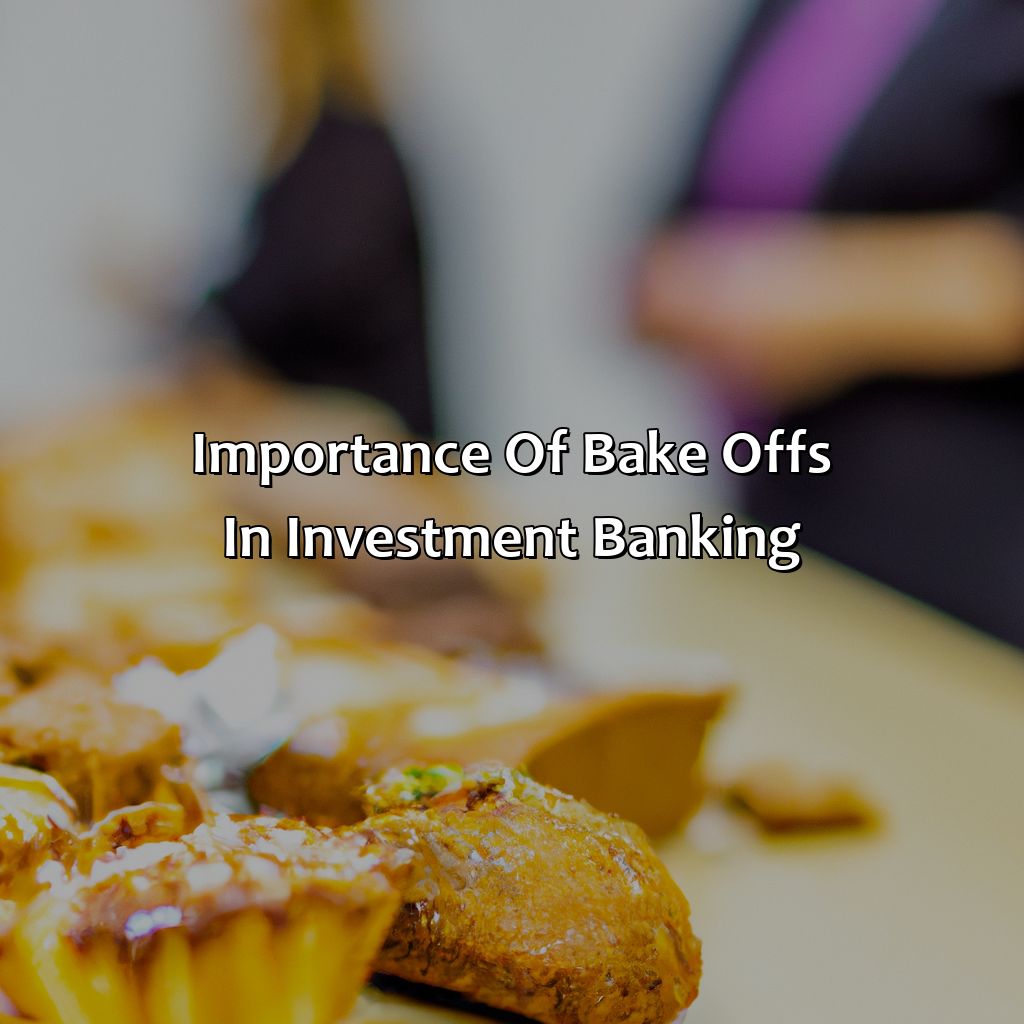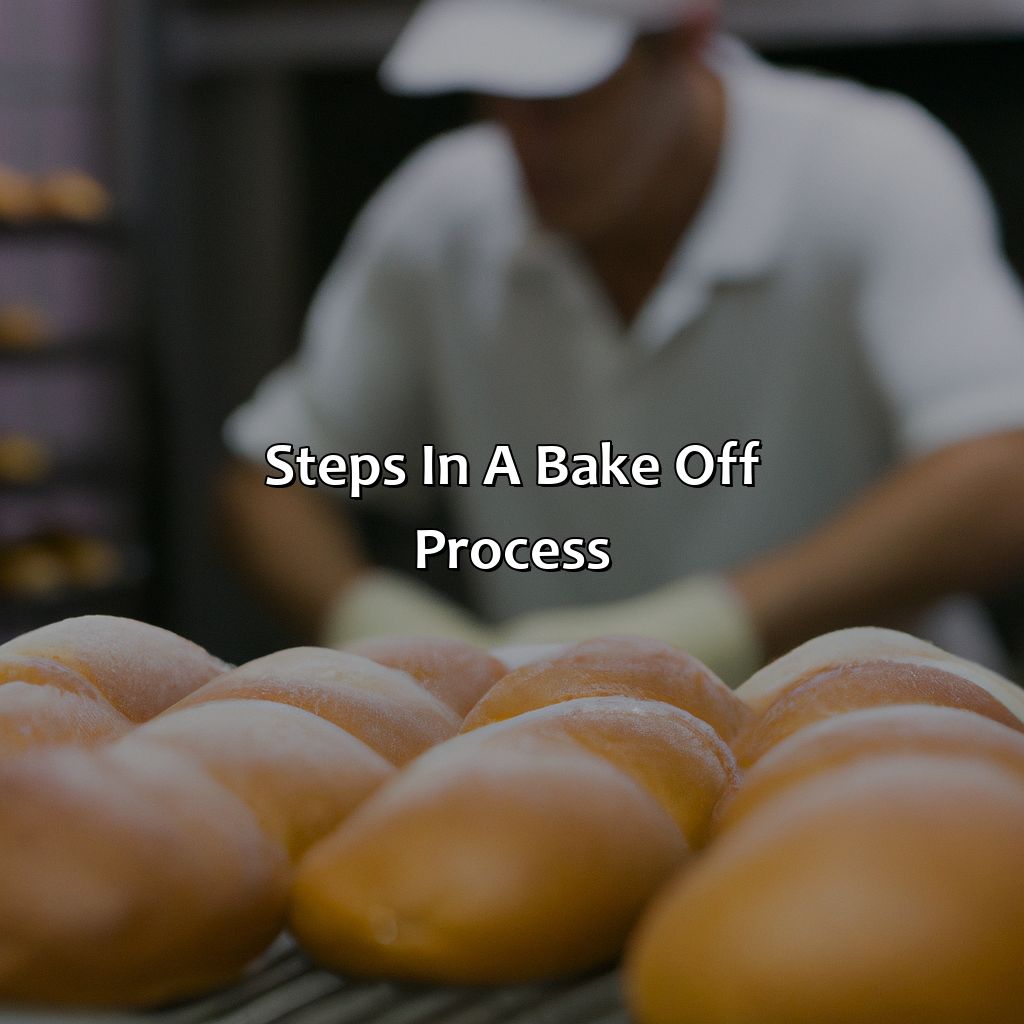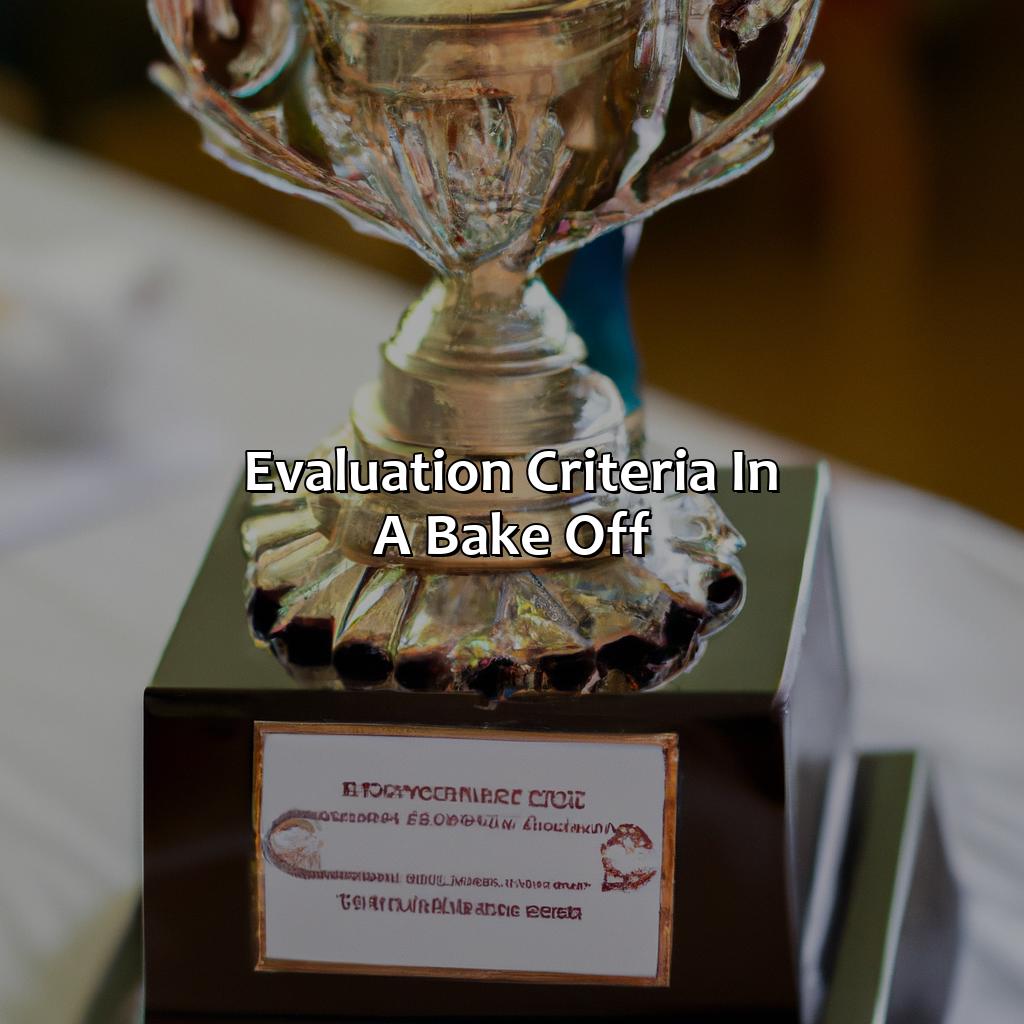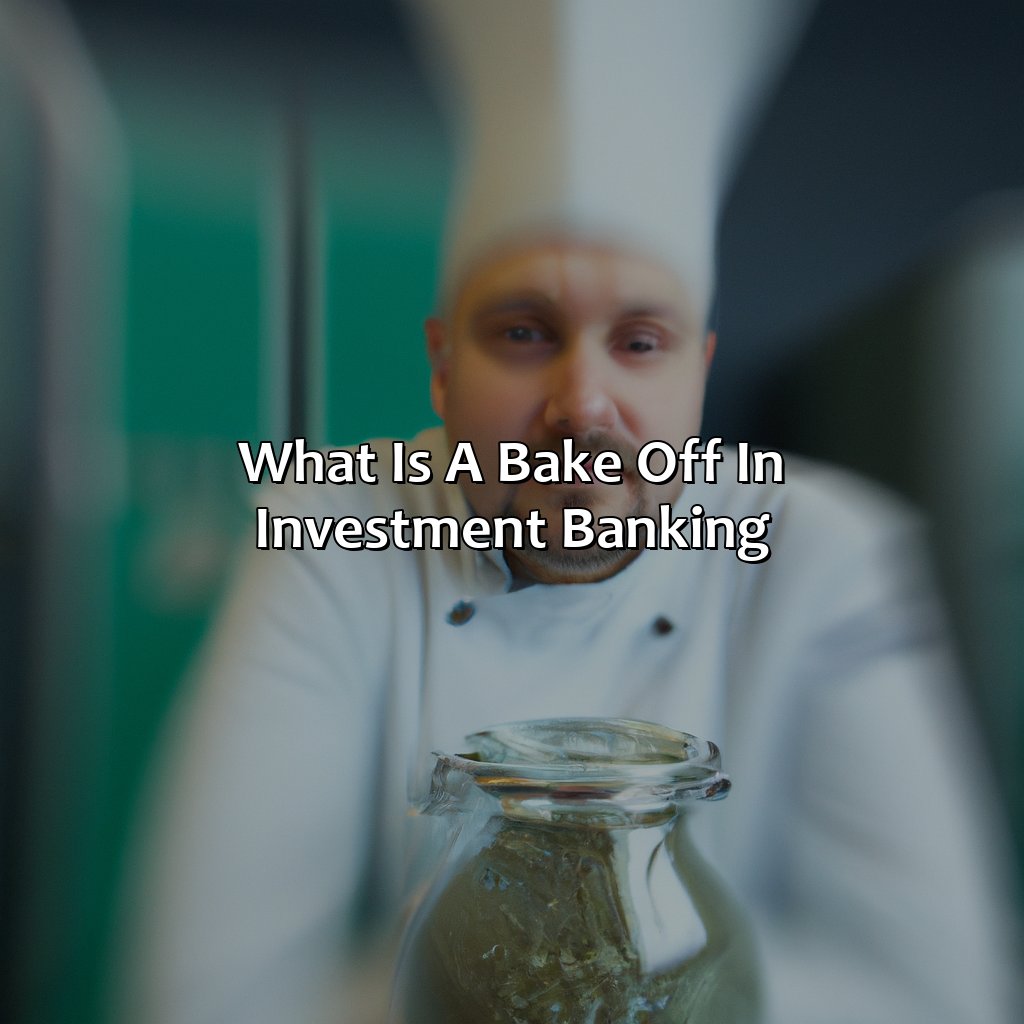What Is A Bake Off In Investment Banking?
Key Takeaway:
- Bake Offs in Investment Banking are competitive processes where banks pitch their services to secure a lucrative deal. It involves multiple rounds of presentations, negotiations, and evaluations to win the deal.
- A Bake Off helps companies in selecting the right investment bank for their project by assessing different banks’ strengths, expertise, and experience. It also helps the investment banks showcase their unique capabilities and gain exposure to potential clients.
- A successful Bake Off should have clear evaluation criteria, a well-defined process, and impartial judges. It should also involve key players like the client’s decision-makers, investment bank’s pitch team, and legal advisors.
Are you wondering what a bake off in investment banking is and why it matters? Looking to increase your financial knowledge? We’ll explore the ins and outs of a bake off and how it can improve your banking career. You’ll be an expert in no time.
Definition of a Bake Off
Investment banking firms often organize a competitive bidding process called a Bake Off. It involves selecting several banks or advisory firms to pitch their services on a specific deal. The firm issuing the RFP leverages the competition to secure the best price and deal structure. During the Bake Off, the issuing firm evaluates the proposals and selects the best fit. This process can also help in negotiating fees and terms with the final bank or firm selected.
A Bake Off is a crucial decision-making process for firms seeking advisory services on significant transactions, typically M&A deals or underwriting. Successful firms are ultimately selected based on their strategic recommendations, team composition, domain knowledge, track record, and pricing.

Image credits: retiregenz.com by James Jones
Importance of Bake Offs in Investment Banking
Many firms use bake offs to select the best investment banking teams for their project. A bake off is a competitive marketing process where investment banks pitch their services to a potential client. The client then chooses the bank that fits their needs best. This process is crucial for the firms as they get an opportunity to display their talents and expertise, which ultimately translates into winning mandates. Furthermore, clients can evaluate the competency of teams they may be considering partnering with.
During a bake off, banks need to present their team composition, expertise, and capabilities. Effective communication of these factors can make a significant difference in winning a mandate. A well-framed presentation with succinct language that demonstrates a keen understanding of the client’s goals can be a deciding factor. Bankers need to highlight their unique selling propositions while also addressing the client’s concerns, issues, and potential roadblocks. Each team member’s expertise needs to be showcased to demonstrate a bank’s capabilities and capacity. Finally, it is essential to demonstrate understanding of the industry and market trends.
Not all banks will succeed in a bake off, so they need to remain constructive with feedback and use it to refine their pitches. Creating a list of strengths and weaknesses can provide an opportunity for improvement. Teams that can effectively incorporate constructive criticism often emerge from bake offs with a better understanding of client needs. By incorporating these suggestions, bankers can demonstrate that they are adaptable and willing to learn from the process.

Image credits: retiregenz.com by Joel Jones
Characteristics of a Good Bake Off
In investment banking, good strategies for winning a new business mandate are essential. A successful pitch involves a bake off, a competitive process in which a financial institution presents its best proposal to secure the mandate. This approach is an effective way to earn new deals in the industry.
- Impressive proposals – The proposal must be comprehensive, targeted and well-planned, with a well-defined strategy to achieve the client’s goals.
- Strong team – It is essential to present a team of experienced professionals capable of delivering high-quality work within agreed timelines.
- Communication ability – In addition to demonstrating financial expertise, excellent communication skills are also necessary to establish rapport and trust with the client.
One important characteristic of a successful bake off that should not be overlooked is the ability to listen. Listening to the client’s needs and concerns can help to tailor the proposal accordingly. By crafting a proposal that aligns with the client’s goals and needs, the chances of securing the mandate are significantly increased.
According to Bloomberg, during the financial crisis in 2008, the Federal Reserve Bank of New York required a bake off amongst investment banks to distribute assets from Bear Stearns.

Image credits: retiregenz.com by Yuval Jones
Key Players in a Bake Off
In the realm of investment banking, a bake off entails bringing together several key players to compete and pitch their services for a particular financial transaction. These players are carefully selected based on their expertise, track record, and reputation in the industry. Each participant in the bake off possesses a specific set of skills which are evaluated during the competition.
- The first player is the investment bank that organizes the bake off, and ensures a level playing field for all participants.
- The second player is the issuer of the financial transaction, who is seeking the best possible terms and conditions for the deal.
- The third player is the potential investor, who is looking for a suitable offering that meets their investment criteria.
- The fourth player is the lead advisor, who is responsible for guiding the issuer through the transaction process.
It is important to note that each participant in the bake off is expected to conduct themselves in a professional and ethical manner. Any deviation from such behaviour can lead to disqualification from the competition. The winner of the bake off is usually chosen based on a combination of factors, which include but are not limited to, pricing, valuation, experience, and expertise.
Interestingly, the concept of a bake off was first introduced by Goldman Sachs in the 1990s as a way to ensure transparency and fairness in the competitive bidding process for financial transactions. Today, bake offs have become a common practice in the investment banking industry and serve as an effective tool for clients to select the best-suited financial transaction advisors.

Image credits: retiregenz.com by James Washington
Types of Bake Offs
Investment banks often employ bake offs to determine which firm will be hired for a specific transaction. The bake off process entails a selection of firms submitting proposals and pitches to the client, followed by a competitive presentation to the client’s management team.
The following table outlines the different types of bake offs:
| Types of Bake Offs | Description |
|---|---|
| Two-Firm Bake Off | A competition between two firms |
| Closed Bake Off | An invitation-only bake off |
| Open Bake Off | An open competition in which any firm can participate |
| Pre-Selection Bake Off | A bake off in which firms are pre-selected based on prior performance or reputation |
It is noteworthy that each bake off type has its specific structures and rules. However, the primary objective remains the same, to secure the business deal. Understanding the nuances of each bake off type is crucial for firms participating in the process.
Firms with expertise in specific industries and products have an advantage in various bake offs. Nonetheless, it is paramount to note that the quality of the pitch and proposal presented also plays a vital role in securing the deal.
If you’re a firm interested in participating in a bake off, it is imperative to conduct extensive research and thorough preparation. The stakes are high, and the fear of missing out on potential business is all too real. By strategically positioning your firm’s expertise and carefully crafting your pitch, you stand a better chance of coming out on top.
Image credits: retiregenz.com by Yuval Arnold
Steps in a Bake Off Process
The process of choosing an investment banking firm for a specific service or transaction is called a Bake Off. Below is a professional guide outlining how it is done.
- Proposal – Firms submit proposals that outline the scope and cost of the service or transaction.
- Presentation – Firms present their proposals to the client, highlighting their expertise and experience in similar transactions.
- Due Diligence – The client conducts due diligence on each firm, including reviewing their past performance and references.
- The Decision – Based on the proposals, presentations, and due diligence, the client selects the investment banking firm with which they will work.
It is essential to note that the decision-making process is not always straightforward and may require several rounds of presentations and revisions before choosing the final firm.
An investment bank once found itself in a bake-off to win a large merger which would have a significant impact on its reputation, as well as earnings. The firm submitted an initial proposal but noticed that the other firm’s proposal had more relevant experience and expertise. The firm decided to present a revised proposal that would highlight its strengths and address the client’s specific needs. The strategy worked, and the firm won the bake-off.

Image credits: retiregenz.com by Yuval Duncun
Evaluation Criteria in a Bake Off
Investment banks use bake-offs to select the best service providers for a project. The process involves inviting firms to compete by submitting proposals. The aim is to evaluate their capabilities and select the best provider. Several evaluation criteria are used, such as experience, team strength, fees, methodology, and value proposition.
| Evaluation Criteria | Description |
|---|---|
| Experience | Demonstrated expertise in similar projects |
| Team Strength | Availability and expertise of team members |
| Fees | Overall cost and line-item breakdown |
| Methodology | Proposed approach and project management |
| Value Proposition | Unique benefits and added value |
In addition to the above criteria, the bank may consider other factors such as risk management, innovation, and regulatory compliance. The ultimate decision is based on a combination of scores and subjective assessments.
To perform well in a bake-off, firms must understand the bank’s requirements, tailor their proposals accordingly, showcase their strengths, and differentiate themselves from competitors. They should also provide clear and concise information, demonstrate their experience, and address potential issues and concerns.
To succeed in a bake-off, firms must focus on their strengths, showcase them, and differentiate themselves from competitors. They should tailor their proposals to meet the bank’s requirements, provide clear and concise information, and address potential issues and concerns.

Image credits: retiregenz.com by David Woodhock
Decision Making After a Bake Off
After a bake off, investment banking firms make crucial decisions based on various factors such as the proposal’s feasibility, revenue potential, and the team’s capability to deliver. The winning team’s proposal could earn them the mandate to lead the deal, but other factors play a role in the ultimate decision. Investment banks often evaluate team dynamics, client relationships and conflicts of interest, among others before choosing a lead manager. A well-structured and comprehensive proposal that showcases deep knowledge of the client’s needs and market trends can help the winning team secure the mandate.
Additionally, investment banks may also consider the size of the deal, the expertise required, and the level of potential involvement by other parties. The decision-making process is usually rigorous and involves various discussions and deliberations from the deal team, senior bankers, and legal counsel, among others. Ultimately, the bank’s reputation is at stake, and hence, decision-makers must exercise proper judgment, weighting all the factors before making a final call.
Pro Tip: Investment bankers should ensure their proposals address all client needs while maintaining accuracy in their projections and expertise in the sector. The proposal should be presented in a clear and concise manner, showcasing the team’s depth of knowledge and understanding of the sector.

Image credits: retiregenz.com by Yuval Arnold
Five Facts About Bake Offs in Investment Banking:
A bake off is a competition between investment banks to win a mandate from a client for a specific financial transaction. (Source: Harvard Business Review)
Bake offs typically involve pitching ideas and strategies for the client’s financial transaction, along with estimated pricing and any potential risks. (Source: investopedia)
Bake offs can be time-consuming and expensive for investment banks, with some spending months and significant resources on preparing and presenting their pitch. (Source: The Financial Times)
Bake offs are a common practice within investment banking for winning business, particularly for lucrative deals. (Source: The Wall Street Journal)
Winning a bake off can lead to significant profits for investment banks, but losing can result in wasted resources and damages to the bank’s reputation. (Source: CNBC)
FAQs about What Is A Bake Off In Investment Banking?
What is a bake off in investment banking?
A bake off in investment banking is a competition held between several investment banks to win a business deal from a client. The banks present proposals and pitch their services to the client, who then selects the winning bank to work with.
How do banks prepare for a bake off?
Banks prepare for a bake off by researching the client’s business and needs thoroughly, and tailoring their proposals to meet those specific needs. They may also allocate more resources and time towards their proposal and presentation to make it stand out from their competitors.
What are the benefits of a bake off?
For clients, a bake off encourages competition between investment banks, which can lead to better deals and more favorable terms. For banks, winning a bake off means gaining a valuable client and increasing their reputation in the industry.
What are the risks of a bake off for investment banks?
Investment banks invest significant resources into preparing for a bake off, and there is no guarantee that they will win the business deal. If they lose, it can be a significant financial and reputational loss.
What happens after a bake off?
After a bake off, the client will select the winning investment bank to work with and enter into negotiations for the deal. The winning bank will then work on finalizing the details of the deal, including pricing, terms, and other considerations.
Are bake offs common in investment banking?
Bake offs are common in investment banking, particularly for M&A deals and financing transactions. They are a way for clients to get the best deal and for banks to showcase their strengths and capabilities.
 Checkout this IRS Loophole
Checkout this IRS Loophole 
